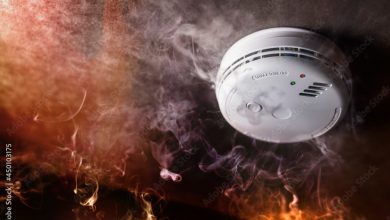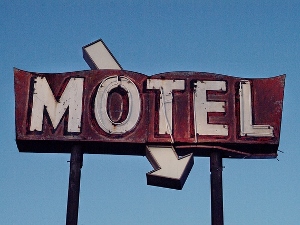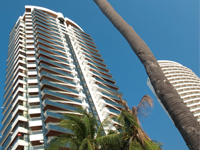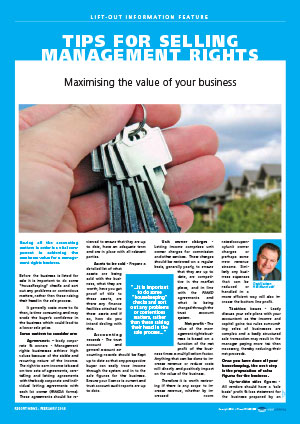
Tips for Buying Motels
The benefits of motel ownership
The benefits of buying a motel are numerous and each prospective motel owner has their own ideas of what interests them and what opportunities that they wish to pursue. It may be the quality and flexibility of lifestyle available, the high return on capital, potential for substantial capital gain, or a combination of all these..
Often a motel will be acquired on the basis of operating it for a few years, then selling on and changing industries. Many however, sell on and then look for another motel, perhaps a larger motel, or one with a restaurant, or one with a higher turnover and profit. There is a large number of motel owners within the industry who have owned and operated many different motels over the years.
They have been very successful in the motel industry and enjoy a good working lifestyle whether it be on a full time or very part time basis.
A few of the benefits of owning and operating a motel include but are not limited to the following:
• High return on investment
For the capital invested in a motel a high return is achievable. Leasehold, freehold and passive investment tenures offer the investor a very high return on investment. When considering risk versus return, the statistics confirm motels are a safe and secure business to invest in.
• Under management
The motel industry is ever evolving and a large number of motels today are operated under management. This is the complete opposite to where the industry was 18 years ago where whoever owned the motel lived on site and operated it themselves. If the day-to-day operation is not desired then this can be a great way to get involved in the industry on a more passive basis yet still offers the ability to stay involved as much or as little as one wants.
• Quality lifestyle
If planning to operate a motel the actual purchase is not only a business decision but a lifestyle choice also.
Motels offer a good working lifestyle for the operators, with the whole family able to live and work together on site, and the meeting of new and interesting people each day.
• Residence/home
Motels almost always offer an onsite residence for the owner, which reduces helps to reduce their living costs substantially, including food, electricity, council rates, insurance, telephone etc. One must be prepared that motel residences were never built to be stand-alone houses and therefore to not have the space todays popular four-bedroom, two-bathroom house in the suburbs.
• Active market
There is a ready market when you wish to sell, as there is always a market for people wishing to buy good motel businesses.
• Stock on hand
There is a small stock component within a motel, whereas in other business types a large amount of stock is required to be carried at all times.
• Cash flow
The first day of taking over a motel there is generally a good cash flow. Most guests today pay by credit card or Eftpos and guests on account are limited to large companies only.
Many large companies have now taken to providing key employees with credit cards for their accommodation requirements thereby limiting accounts even further.
• Capital gains
There is always an opportunity to increase the value of the motel and make a capital gain upon sale depending on the quality of operation. The trend of motel values over the past 18 years has been a steady and consistent rise in values that has generally resulted in good capital gains. As with any market is does fluctuate so timing is important.
• Finance
Banks and financial institutions are generally eager to lend money for the purchase of motels. Traditionally motels have been a solid and secure investment, whether leasehold or freehold, and this good history gives financiers confidence in lending to purchase motels.
• Tax benefits
There are numerous taxation benefits available to motel owners such as depreciation of plant and property, living cost benefits, etc.
• Return on investment
The market determines the return on investment of a motel. There are numerous matters that affect the rate of return in the market. The fact that each motel is different means at times it is difficult to compare one to the next.
Some of the factors affecting return on investment include:
• Location
Whether a motel is located on the coast or inland is a major factor determining the return on investment. Historically the demand for a coastal motel will be higher therefore pushing the value of the motel higher and the return on investment lower. Location is an important factor to consider when buying a motel, decisions on where to buy a motel can be based on lifestyle or return. It must be considered that motels in desirable locations such as coastal areas will not show returns to the level that an inland motel will. Inland locations may not seem as desirable from a lifestyle point of view as coastal locations (to some), however there can be substantially higher returns by buying a motel in an inland location.
• Condition or standard
If a motel is in poor condition, requiring repairs and maintenance or refurbishment, the market will expect a much higher return on investment than a motel that does not require this. Poor presentation affects the value of a motel considerably. High quality motels are always in demand and as a result achieve sales on lower returns or higher prices.
• Age of buildings
A newer more modern building/motel will be in higher demand than an older building/motel and will therefore sell on a lower return or investment. This does not mean that older motels will not depending on how they have been maintained.
• Size
A smaller motel traditionally sells on a lower return on investment, as there can be more competition for these motels within the “mum and dad” sector of the motel market due to affordability.
• Operational factors
This covers are wide area relating to the business operation itself such as the type of clientele the motel attracts, profitability, sales revenue, income departments such as accommodation, food and beverage, etc and the sustainability of the business going forward, just to mention a few.
• Potential for adding value
Opportunity to improve a motel operation is of significant interest to many if not all motel investors and is often available where the next owner looks at a part of the business with fresh eyes and perhaps sees an opportunity. This opportunity may be a buying motive that affects the return on investment. Are there areas of the business are underperforming? Where can improvements be made over and above the current operation? Keep in mind that almost no motel business ever operates at its full potential and there is always room to improve with fresh ideas and renewed marketing strategies.
The above items all have a role in the return on investment that a motel investor wants to achieve to satisfy their buying motives.
Leasehold vs freehold
There are many factors specific to both freehold and leasehold that are a consideration for buying one or the other.
Freehold
- Size of land component;
- Spare land for expansion; and
- Value of the land itself.
Leasehold
- Annual rental;
- Lease terms – the lessee and lessor’s responsibilities; and
- Length of lease.
The lists could go on and on. What will suit the individual, is the answer to whether a freehold or leasehold motel is the most suitable. Throughout the 1990s motel operators were only interested in buying freehold and leasehold was very much in its infancy. In today’s motel industry however, the benefits of leasing are highly sought after by the broader market who are trying to achieve a higher rate of return over a shorter time frame.
Many choose to buy leasehold today due to the lower capital outlay required and the higher return on investment, in many cases double the return a freehold property offers. The ownership of freehold property still attracts a wide market that does not want to pay a rental and who have a future intention of leasing the property to retain as a passive investment. This is a highly sort after investment strategy for many motel owners. A large number of investors have succeeded financially from the motel industry over the years and continue to buy, sell and accumulate motel properties.
How much cash (or equity) one has available will also play a major role in determining whether leasehold or freehold is the best option. A cash component of $500,000 will allow you to buy a leasehold motel up to $1,000,000. This will generally be a 16+ unit motel of good quality, with a net profit after costs of approximately to $280,000 pa – $300,000 pa. On the other hand, the same cash component of $500,000 will allow you to buy a freehold motel up to $1.4 – $1.5 million.
This will generally be a 14+ unit motel of good quality with a net profit after costs of up to approximately $225,000 pa. These details and numbers are generalised, as they are dependent to a large extent on location, standard of quality, age of buildings and income per annum.
Due diligence
It is recommended no matter what type of business you are buying that a due diligence is completed to the buyer’s complete satisfaction. Some buyers do not require a due diligence, and this is fine, as it is up to each buyer to decide what they require. Most who do a due diligence employ the services of an accountant who has handled motel due diligence inspections previously, and is a specialist in the motel field. A due diligence is mainly completed to confirm that the business is performing as presented, and to give the buyer piece of mind that what they believe they are buying is actually the case. Motels have a number of “tells” as far as whether or not they are performing as presented in the financial statements. Therefore it is not difficult to do a quick check from the outset as to whether or not one believes the data appears on the surface to be reasonably accurate.
Building and pest inspections
Building and pest inspections of motels are generally only requested by purchasers of the freehold property of a motel. It is rare that the purchaser of a leasehold motel will include a requirement for a building and pest inspection. A thorough inspection of a building by a licensed professional is a good idea if there is some doubt over the integrity of the structure and/or pest infestation.
The use of suitably qualified and experienced professionals is a decision, which can make life either very easy or very difficult in the motel purchase process. To have an accountant, motel broker, solicitor and financier who specialises in the motel industry is extremely important in the transaction. Many times I have seen inexperienced or unqualified “professionals” handling motel sale and purchase transactions for clients and it ends up becoming more difficult and frustrating for all parties than it needs to be.
Most people are very excited about moving into their new motel and too often the process can be soured by not utilising the services of specialists in the industry. It is highly recommended to consult with the parties you are about to deal with in order to confirm their suitability for the job.
Click here to download the full tips for buying motels








